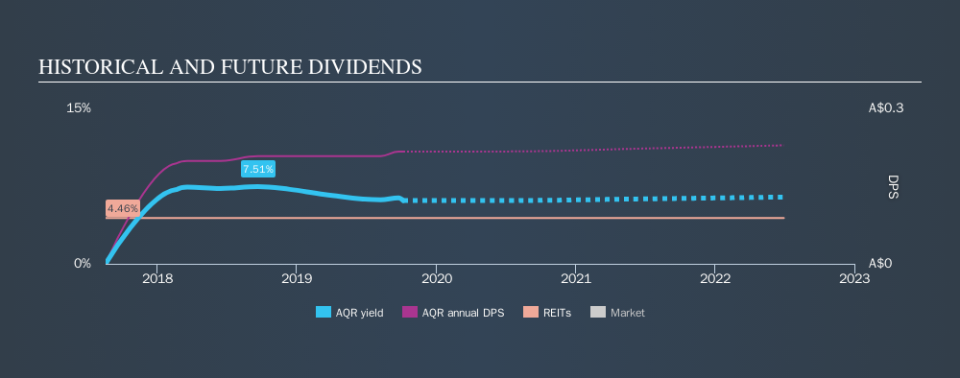Is APN Convenience Retail REIT (ASX:AQR) A Great Dividend Stock?

Today we'll take a closer look at APN Convenience Retail REIT (ASX:AQR) from a dividend investor's perspective. Owning a strong business and reinvesting the dividends is widely seen as an attractive way of growing your wealth. On the other hand, investors have been known to buy a stock because of its yield, and then lose money if the company's dividend doesn't live up to expectations.
APN Convenience Retail REIT yields a solid 6.1%, although it has only been paying for two years. A high yield probably looks enticing, but investors are likely wondering about the short payment history. Some simple research can reduce the risk of buying APN Convenience Retail REIT for its dividend - read on to learn more.
Explore this interactive chart for our latest analysis on APN Convenience Retail REIT!
Payout ratios
Dividends are typically paid from company earnings. If a company pays more in dividends than it earned, then the dividend might become unsustainable - hardly an ideal situation. Comparing dividend payments to a company's net profit after tax is a simple way of reality-checking whether a dividend is sustainable. In the last year, APN Convenience Retail REIT paid out 96% of its profit as dividends. Paying out a majority of its earnings limits the amount that can be reinvested in the business. This may indicate a commitment to paying a dividend, or a dearth of investment opportunities.
Another important check we do is to see if the free cash flow generated is sufficient to pay the dividend. APN Convenience Retail REIT paid out 99% of its cash flow last year. This may be sustainable but it does not leave much of a buffer for unexpected circumstances. It's encouraging to see that the dividend is covered by both profit and cash flow. This generally suggests the dividend is sustainable, as long as earnings don't drop precipitously.
REITs like APN Convenience Retail REIT often have different rules governing their distributions, so a higher payout ratio on its own is not unusual.
Consider getting our latest analysis on APN Convenience Retail REIT's financial position here.
Dividend Volatility
From the perspective of an income investor who wants to earn dividends for many years, there is not much point buying a stock if its dividend is regularly cut or is not reliable. The dividend has not fluctuated much, but with a relatively short payment history, we can't be sure this is sustainable across a full market cycle. During the past two-year period, the first annual payment was AU$0.20 in 2017, compared to AU$0.22 last year. This works out to be a compound annual growth rate (CAGR) of approximately 5.7% a year over that time.
The dividend has been growing at a reasonable rate, which we like. We're conscious though that one of the best ways to detect a multi-decade consistent dividend-payer, is to watch a company pay dividends for 20 years - a distinction APN Convenience Retail REIT has not achieved yet.
Dividend Growth Potential
Dividend payments have been consistent over the past few years, but we should always check if earnings per share (EPS) are growing, as this will help maintain the purchasing power of the dividend. APN Convenience Retail REIT has grown its EPS 38% over the past 12 months. It's good to see earnings per share rising, but one year is too short a period to get excited about. Were this trend to continue, we'd be interested. A majority of profits are being paid out as dividends, which raises the question of what happens to the current dividend if earnings decline. However, the rapid growth in earnings may indicate that is less of a risk. We do note though, one year is too short a time to be drawing strong conclusions about a company's future prospects.
Conclusion
Dividend investors should always want to know if a) a company's dividends are affordable, b) if there is a track record of consistent payments, and c) if the dividend is capable of growing. APN Convenience Retail REIT's is paying out more than half its income as dividends, but at least the dividend is covered by both reported earnings and cashflow. Next, earnings growth has been good, but unfortunately the company has not been paying dividends as long as we'd like. Ultimately, APN Convenience Retail REIT comes up short on our dividend analysis. It's not that we think it is a bad company - just that there are likely more appealing dividend prospects out there on this analysis.
Now, if you want to look closer, it would be worth checking out our free research on APN Convenience Retail REIT management tenure, salary, and performance.
If you are a dividend investor, you might also want to look at our curated list of dividend stocks yielding above 3%.
We aim to bring you long-term focused research analysis driven by fundamental data. Note that our analysis may not factor in the latest price-sensitive company announcements or qualitative material.
If you spot an error that warrants correction, please contact the editor at editorial-team@simplywallst.com. This article by Simply Wall St is general in nature. It does not constitute a recommendation to buy or sell any stock, and does not take account of your objectives, or your financial situation. Simply Wall St has no position in the stocks mentioned. Thank you for reading.

 Yahoo Finance
Yahoo Finance 
